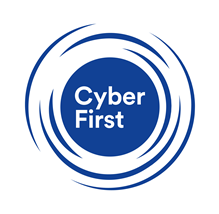CyberFirst is a programme of opportunities developed by the National Cyber Security Centre (a part of GCHQ), to help young people explore their passion for technology by introducing them to the fast-paced world of cyber security.
CyberFirst covers a broad range of activities: a £4k-a-year comprehensive bursary scheme to financially support undergraduates through university; a girls’ only competition, and thousands of free places on CyberFirst courses.
In the following article, Chris D explains how as a mature student he has forged a path from the hospitality sector into the CyberFirst Bursary programme and how it has helped him secure an invaluable role in teaching the next generation of cyber security and computing professionals….
Chris D – from Hospitality to Teaching computing and cyber security
‘I went back into college education as a mature student at the age of 33 after spending 15 years in hospitality and it’s here I heard about CyberFirst in a UCAS email. I applied twice. The 1st time I didn’t have the requirements to go to university, however during my second year at college I reapplied and was accepted on to the scheme. The great thing about the assessment is that providing you have 120 UCAS points, it doesn’t matter what subjects you have studied or you plan to study at university – it’s all down to your aptitude and your interest in computing and technology. So people like me, with a previous career in hospitality, were eligible to apply.
At the end of my first year at university, I attended the CyberFirst Academy for 8 weeks in Scarborough where I learnt a huge amount. I enjoyed it so much that I came back and facilitated the Academy online for my second year. This inspired me to contribute more when I got back to university. As president of the university’s computing society, I was asked if I would do the undergraduate freshers’ demonstrations. I came up with a task based around something I learned at the Academy: remotely accessing and taking control of a drone. I created a scenario and gave the freshers a challenge to ‘bring down’ the drone within a time-limit and convinced the faculty to purchase the drone for me – what’s not to like?
The exercise was very popular and I followed it up the next year with a demonstration showing how brute force password attacks might work to compromise a WIFI network using Zoom. My previous college also contacted me and asked if I would be happy to give a talk about my time at university and where I had gone from college, so I went back with the drone and got the students doing challenges as well. A huge success and numerous repeat bookings!
This work with schools, colleges and freshers made me realise that I really enjoyed teaching and wanted to inspire the next generation to pursue cyber and computing in general. At the time, the CyberFirst Bursary scheme was primarily geared to preparing students for working in industry and government once they had graduated. After a lengthy email and a few chats with the CyberFirst team, I was delighted to see that the NCSC had added ‘Teaching Computing and Cyber Security’ as an approved role.
Thanks to CyberFirst I had the confidence and skills to bring my knowledge to the next generation in an interesting and fun way and could convert what I have learnt into challenges that capture people’s interest and imagination.
I am happy to say I graduated from university with a First-Class Honours degree and secured a role with a local SCITT (School Centred Initial Teacher Training). I was also awarded a BCS Teaching Scholarship – none of which would have been possible without the opportunities afforded to me through CyberFirst.’
How can I find out more?
If you plan to go to university in September 2023 and have an interest in computing and the myriad of career options the CyberFirst Bursary scheme prepares you for, then you can see more information at https://www.ncsc.gov.uk/cyberfirst/bursary-and-degree-apprenticeship

